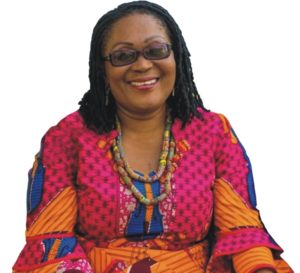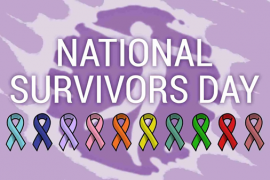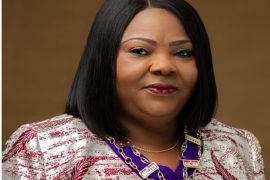Born to average parents and from humble beginnings, fifty-two year old Lordina Mahama, First Lady of the Republic of Ghana, today straddles many worlds – impacting her communities and giving hope to countless Ghanaians. Lordina who hails from Jema-Ampoma in the Nkoranza District of the Brong Ahafo Region of Ghana was born on 6th March 1963 to Mr. and Mrs. Effah of blessed memory. The last of three children, she had her early education in Tamale at the Tishigu Anglican primary school.

At the Ghana Secondary School, her alma mater, she had a deep passion for entrepreneurship and culinary business. This passion naturally led to her studying Catering Services, and a Bachelor of Arts degree in Hospitality Management at the Ghana Institute of Management and Public Administration (GIMPA). She also studied for a Master of Arts in Governance and Leadership, again, at GIMPA.
As Ghana’s First Lady, she serves as National President of her organization, the Lordina Foundation, previously known as the Alternative Source of Income Programme (ASOIP).
Mrs. Mahama is the first to admit that wearing the hat of First Lady, National President and being a mother for all Ghanaians can be daunting. However, she manages to keep a strict regimen that enables her fulfill all these roles in simply amazing ways. It is this capacity which has enabled her to run not only a family of growing children and a ceaseless flow of visitors but remain a successful supporter of H.E President John Dramani Mahama in both his domestic and political lives.
When she is not performing her soul’s passion as a philanthropist and great hostess, she is likely to be reading, travelling or cooking. If Lordina’s prime vision of providing opportunities for the needy is so strong, it is because she has an unwavering belief in the intrinsic goodness of humanity and is a crusader to youths to be morally upright and academically prepared to take over their future using the Lordina Foundation as a platform for societal impact.
Since the launch in 2009 of Alternative Source of Income Programme (ASOIP) now LORDINA FOUNDATION, First Lady Mahama has focused on its primary objective, which is to cater for destitute and vulnerable children and women (especially young women), so as to bridge the gap between the fortunate, particularly in areas of education, healthcare and vocational training, and the less fortunate.
According to the Ghana Health Service, there are about 1.2 million orphans in Ghana with about 4,500 of these in orphanages.
However, though efforts have been made (and are still being made) to increase the number of homes to house orphans, studies indicate that many of them are continually deprived of access to nutrition, education and healthcare. It is based on statistics such as these that Lordina Foundation through its social intervention programmes, has led the drive to construct a bridge of hope for these defenseless children and women.
Some of the high points of Mrs. Mahama’s intervention are highlighted in certain key areas listed below. It was for these achievements and societal impacts, among many others, that led the Centre for Economic and Leadership Development, a leading Nigerian NGO in consultative status with the United Nations ECOSOC, to honor Mrs. Mahama with the Global Impact Awards as well as been induction into the Global Women Leaders Hall of Fame at the Africa-Middle East- Asia Women Summit which took place in Dubai, UAE. Mrs. Mahama has continued to touch the lives of ordinary Ghanaians in uniquely outstanding ways.
ENGAGING THE WITCHES CAMPS
It is estimated that over seven hundred (700) women and about eight (800) children live in the Gambaga witches camp and five other camps in the north of Ghana.
In these camps, the inhabitants are virtually cut-off from the outside world. They have very few basic health and education facilities. Their children and, often, grandchildren grow up inside the camp.
In response to the challenges confronting the inhabitants of the Gambaga camp, Mrs. Lordina Dramani Mahama, after a visit to the community, initiated a housing project to accommodate the more than 200 alleged witches at the camp mostly women and their children. With the support of government, the Lordina Foundation is constructing a vocational institute for girls and attached to the camp.
Mrs. Mahama says adding education and skills training will help educate and empower the young girls in the community economically, and also help them to know their human rights. The opportunity to train the women and their daughters to acquire various skills will also help with their re-integration into their original communities.
The alleged witches are effectively confined to the local area and are forced to live communally in a camp. Gambaga, a market town in Ghana’s East Mamprusi district of the Northern Region, has played host to the camp for more than 200 years.
When an accusation of witchcraft is made, the accused is totally ostracized from her community and often has to flee for her life. The outcasts are forced to leave their homes and families, and although they can work and trade, they are typically poor, demeaned and stigmatised by their situation.
Education is key to tackling the situation, both in challenging people’s belief in witchcraft and in changing their attitudes towards traditional gender roles. The Gambaga women endure their unfortunate condition with cheerful, humbling stoicism.
The First Lady of Ghana has stated her determination to help these women and children feel the affection they so much desire and deserve.
IMPROVING CONDITIONS FOR ORPHANAGES
Many orphanages in Ghana, like in most African nations, are in deplorable states, hardly a place to call a home. Children living under these conditions have to bear hardship, disease and toil. Driven by her passion for philanthropy and humanity, Mrs. Mahama is pursuing a mission to create “homes” within these orphanages, a place children can be nurtured to grow, develop and attain their full potentials.
The Lordina foundation aims to continue to raise awareness and funds to improve the infrastructure of orphanages, hospitals and schools in deprived communities in Ghana. it is also committed to continue to support brilliant but needy students and pupils to realize their dreams and potentials.
The Anfaani Children Home in the Vittin Estates, Tamale and the Tamale Children’s Home in Kalpophini are some of the orphanages that have benefitted from Mrs. Mahama mission.
STANDING UP FOR WOMEN’S HEALTH
Almost every minute of every day, a baby is born with HIV, passed on by their mother during pregnancy, labour or delivery.
An estimated 2.5 million children around the world are living with HIV/AIDs according to the joint United Nations program on HIV/AIDs (JNAIDS) 2010 Report on the global AIDS epidemic. The situation is not different in Ghana.
Since her election as Vice President for West Africa of the Organisation of African First Ladies Against HIV and AIDS (OAFLA), First Lady Mrs. Lordina Mahama has been working, in collaboration with the Ghana AIDS Commission, to ensure that the UNAIDS Global Plan to eliminate Mother-to-Child Transmission (PMTC) of HIV is achieved. She is also passionately committed to the vulnerable and marginalized in society, as well as ensuring the health of women, including breast and cervical cancer initiatives.
To achieve the objectives of the project, she has successfully implemented the Ghana Chapter of the OAFLA’s HIV and AIDS, Breast and cervical Cancers project in the Eastern, Brong Ahafo, Greater Accra, Central & Western Region.
The initiative, which focuses on efforts to achieve the national and global targets of the PMTCT and empower women to take charge of their reproductive health needs, has received the support of chiefs, queen mother’s religious leaders, political authorities, civil society and health personnel in the two regions.
The project has as its theme “Prevention of Mother to Child Transmission as the key to an HIV Free Generation.” This is also in line with the Ghana PMTCT scale-up plan and its approach to prevent HIV infection in women of reproductive age, HIV transmission from mother to child and providing on-going care and support for mothers.
Currently, there are 235, 982 people living with HIV in Ghana, out of which 60 per cent are females and 11.7 per cent children, in 2012, the prevalence rate was 1.37 percent. In the same year, 852 children were newly infected with the deadly disease.
Breast cancer, which is a leading cause of death among women, also records about 2,000 cases annually in the country, additionally; more than 3,000 women are diagnosed with cervical cancer annually, with over 1000 dying from the disease every year. In spite of these tough challenges, Mrs. Mahama has continued to wage a tireless war against these societal ills.
As the UNAIDS Premier Ambassador against HIV and AIDS in the country, Mrs. Mahama’s aim is to reduce stigma and discrimination against people living with HIV and AIDS. The project is also aimed at mobilizing resources, stakeholders, community leaders and political heads to promote the development of effective HIV, breast and cervical cancer strategies.
Using persons living with HIV, including the Ghana AIDS Commission’s Heart-to-Heart ambassadors, the project seeks to inspire communities and persons living with the disease by giving them a platform to share their experience.
Launching the project in Koforidua in the Eastern region on October 25m 2913, Mrs. Mahama urged women to go for regular check-up for early detection and prevention of HIV and AIDS, breast and cervical cancers. Every woman must check her breast for lumps each month. “If you find a lump, see a doctor, immediately, and every woman must be examined by a doctor or nurse to make sure that her cervix is normal” she advised.
She added that the transmission of HIV from mother to their infants contributed substantially to global morbidity and mortality for children less than five years. Mrs. Mohama pointed out that, fortunately, prevention of mother to child transmission of HIV could be accomplished by effective, accessible and scalable interventions within the existing maternal and child health services which were available in health facilities.
“Without diagnosis and treatment, about 30 per cent of HIV-infected pregnant women will transmit HIV to their children”, she said
Lordina Mahama is optimistic the prevention of mother to child transmission of HIV (PMTCT) is the key to a new generation free of HIV. According to her, the country’s pursuit to reach zero new infection and AIDS related deaths and zero discrimination is within reach.
As she takes the fight towards enhancing the livelihood of Ghanaian women, she has become a beacon of hope and source of inspiration to countless women across the globe, in Africa, and especially to her native Ghanaians.




